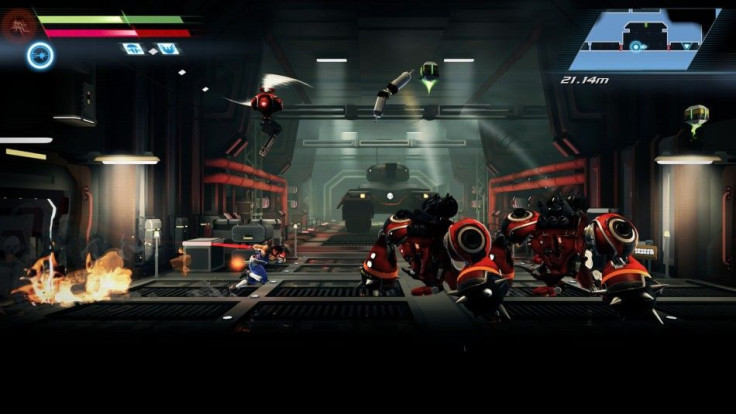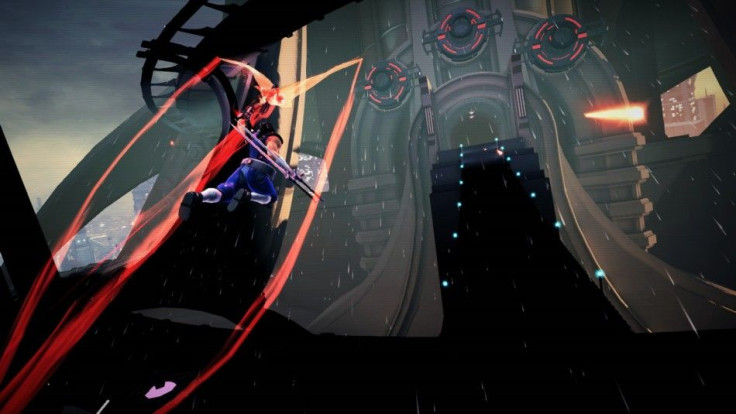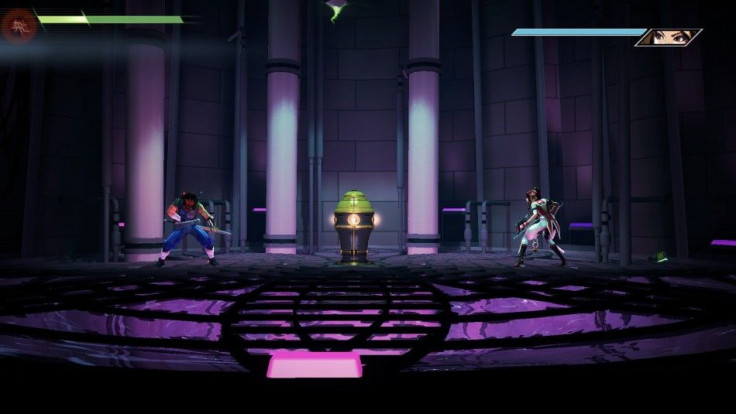For as long as I can remember, there was a pizza restaurant in my hometown that housed a functional Strider cabinet; a relic of the arcade era that managed to survive more than two decades of daily abuse before the restaurant closed its doors for the final time.
I can't even begin to guess how many quarters I pumped into that Strider machine over the years, fully aware that each trip yielded little (if any) progress over previous encounters with a game that clearly wasn't as fond of me as I was of it. It didn't matter, though. Every time I found myself at Crystal's, I'd tear through a few slices of pizza and then make my way back to the section of the arcade where I knew that Strider cabinet would be waiting.
As I got older, trips to that particular pizzeria became less common, and a few years ago I actually decided to moved several hundred miles away from both the city and state where I'd spent the vast majority of my life. Naturally, that meant moving hundreds of miles away from my favorite arcade cabinet, too.
Obviously, my enjoyment of one arcade cabinet, housed at a pizza restaurant that seemed to stay open about a decade longer than should have been possible, wasn't going to be enough to keep me in my hometown forever. But that doesn't mean my love of the original Strider arcade ever waned.
So you can only imagine the look of joy that washed across my face when Double Helix announced plans to revive the franchise on PC, PlayStation 4 and Xbox One last year; an announcement that just so happened to take place during my first trip to E3. Of course, by the time Strider was available on Steam the hopeful Scott of 2013 had been replaced by a ball of nerves. In fact, I was practically convinced that I was walking into some sort of budget-priced Double Helix trap.
What if I didn't enjoy the studio's new take on Strider? What if the game couldn't meet the admittedly-lofty expectations I had for anything carrying the Strider name? What if Double Helix ruined one of my favorite arcade games of all time?
Thankfully, I won't have to figure out how to answer any of those questions.
Because Strider is f--king awesome.
Like the 1989 arcade classic, Strider sees players take control of Strider Hiryu, the youngest-ever Super A-ranked Strider in the history of the shadowy organization, just as the mercenary makes his final descent upon Kazakh City.
Rather than dump you into a traditional tutorial, your first few steps are greeted by confirmation of your objective -- the assassination of a reclusive dictator known as Grandmaster Meio -- and from there it's off to the races. Players receive a few pointers along the way, though typically little more than a basic overview of each new move/ability as its gained, but it isn't long before the game turns you lose inside of Kazakh City.
Of course, given the totalitarian nature of Meio's rule, you won't exactly be allowed to walk up and ring the Grandmaster's doorbell. Instead, waves upon waves of enemies will need to meet the sharp edge of your sword before you're ever given a chance to go toe-to-toe with the target of your hunt, and (like any arcade classic) some over-the-top bosses will need to be conquered along the way as well.

The new Strider ditches the stage-based progression of its predecessor in-favor of a Metroidvania style adventure that still manages to revisit a number of iconic locations from the original. This year's take also features a number of Strider's robotic companions, called "Options", each of whom has been incorporated into the assassin's drastically-expanded move set. Options can either be called upon in battle, with varying results, or can be used to access previously inaccessible portions of Kazakh City.
Along the way, players will also collect plasma modifiers that allow you to alter the types of damage being dealt by your sword at any given time, each of which (in true Metroidvania fashion) will also grant you access to specific areas scattered across Kazakh City. Some enemies will also carry shields that can only be broken by certain types of damage, adding just enough depth to the combat to keep you from feeling like Strider involves little more than running left/right and mashing the attack button. Don't expect the sort of hot-swapping found in games like Devil May Cry or God of War, though.

As I mentioned before, rather than adhering to the staged progression of its predecessor, Double Helix incorporates a number of traditional action-adventure mechanics into its Strider reimagining. The most notable among those include an increasingly-explorable game world; one that gradually opens up to players as you find new powers and conquer the various baddies trying to prevent Strider Hiryu from killing the Grandmaster.
All of the classic Strider environments are included in the Double Helix reimagining as well, along with a couple of new entries to help flesh out the Strider world map, now that players have more freedom to roam between the various stages of the game. Most of them will blend together into a seemingly endless series of rooms and corridors; however, longtime Strider fans are likely to spot at least one or two set pieces that they remember from the original.
Unfortunately, you won't see save spots anywhere on the map, as the new Strider quite painfully relies on the same developer-defined checkpoints and save triggers that most games have abandoned in the modern era.

In fact, the lack of communication regarding checkpoints and saves in Strider might be one of the game's biggest weaknesses, and are likely to lead to some measure of frustration from whatever community emerges around the remake. Though hardly problematic for anyone who finishes the game in one or two sittings, like me, it's not hard to imagine more time-constrained gamers running into the frustrating reality of lost progress if/when they close the game before reaching a new save point.
I myself was a victim of such a loss, losing about 20-30 minutes of progress after stopping for dinner, because I foolishly assumed that a game without any means of saving manually would automatically save my progress in the minute or two after I dropped a boss. Fortunately, I didn't lose much progress, but I did find myself wishing I had more control over my saves -- or at least better communication about the process --on multiple occasions during my time with Strider.
On the plus side, Strider isn't exactly Dark Souls, so trying to figure out where I might respawn if an encounter went south wasn't exactly a routine problem. Still, while I know some people still seem to be obsessed with how other people might play/enjoy the game, can we just agree that any future Strider releases give players the freedom to save and walk away at will?

Anyone considering a purchase should know that Strider won't be winning any awards for longevity, even if you do decide to pursue all of the game's secrets, but I'm personally of the opinion that this is a prime example of a time when a studio simply knew when to quit.
According to the game's timer, I finished Strider in just over five hours (with 68% completed), though Steam had my total play time pegged closer to seven hours, and many of the first-hand accounts I've seen seem to suggest a 100% run would've only added two or three hours to total time played. Once I've finished the challenge maps, and revisited the campaign on Hard, I'm sure I'll be getting closer to the 15-20 hour range.
Some are also likely to criticize the game's difficulty, or lack thereof; however, I think there's some value in the overall Strider experience. You aren't going to feel like the best video game player in the world when the credits roll, but there are likely to be more than few times during the Strider campaign when the fluidity with which you dispatch your enemies will leave you feeling at least a tiny bit like the badass ninja assassin you're in control of.
Strider Review - Final Verdict
Strider isn't a perfect game, but its shortcomings are the sorts of weaknesses that I don't mind overlooking in a video game; in no small part because they don't inhibit my appreciation and/or enjoyment of the content present in Double Helix's Strider remake.
At fifteen dollars, Strider is a tremendously easy recommendation, whether you have fond memories of the original Strider games or the 2014 reimagining is your introduction to the franchise. It's campaign is just long enough to tell a complete story, without giving you time to realize just how thread-bare that narrative actually is, and will have you feeling like a badass the entire time. Hell, Strider is the sort of game I could see myself building a cheap cabinet for -- with some means of playing the original, too, of course -- and I'm not sure what higher praise you could give to a game seeking to put a new twist on a 25-year-old arcade classic.
Seriously, if you have any fond feelings for the Strider franchise, or just a couple of extra dollars burning a hole in your Steam wallet, do yourself a favor and buy a copy of Strider at your earliest convenience.
Score - 4/5
What did you think of Double Helix's Strider remake? Think Scott's judgment of the game was clouded by fond memories of the original? Is there another arcade classic that you'd like to see get a modern remake in the near future?
Let us know in the comments section!

















